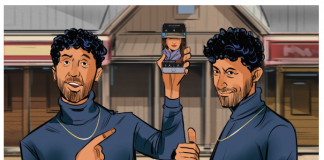
Do you want to draw for a living?
I am the first person to advocate anyone taking on a creative career. However, if you want to make money at it, expanding your professional creative side is a first step to finding a rep and seeing art as a business.
I get where you’re coming from.
As an artist myself, I was fortunate to come from a creative home. Not just creative, but one that centered around the advertising business. And what is advertising all about? Selling. Never forget your ABC’s. Always Be Closing.
With a degree from School of Visual Arts, raised in the advertising mecca (New York City), and moving to the movie mecca (Los Angeles) to design events, creatures and sets for movies, I earned years of experience as a paid artist myself. This is my foundation of understanding where you are coming from and how to get you to the next level. With my passion of helping and developing the careers of other artists, I’ve been an artist agent now for 15 years.
I represent professional sketch and storyboard artists, and concept illustrators in the Film, Fashion, Television, Video Game and Advertising industries. When our clients need to sell an idea, they need strong visual development to support it. That may require the creation of a creature, a layout for a cat food ad, solving a car chase scene or simply rendering a box of cereal from a particular camera angle in a mid century mod kitchen.
Want to get my attention for representation?
In one average week of work I will receive an estimated 25 portfolios. Behind those portfolios are numerous artists looking for a way to get paid professionally for their art and illustration via an agent. Not many make the cut. Want to know why?
To answer that question, I’ve compiled seven basic errors that I see everyday.

#1 – BAD FIRST IMPRESSION
Your first impression is your email. Be concise, and please make sure there are no typos! Nothing is more contradictory than telling me in a letter how precise and detail oriented you are with grammatical errors, wrong attentions/company name and typos everywhere. It is a huge pet peeve of mine. On that topic, I am not looking for an administrative assistant, so emailing with adjectives about how great you are is a waste of our collective time.
That being said, please don’t send me a 500 word document on yourself. We both have work to do, and the first thing I am going to look at is your art. I will come back to know more about you if interested. All I need to know is:
Have you worked in the industry? How long? Who are some of your clients?
How do I reach you? Is there a clear phone number and email? Where are you located? Remember, you want to hook me, not lull me to sleep with your life story at first glance.
#2 – NOT SELLING ME ON YOUR ART
Just like the advertising world, you want to brand and sell yourself with your art and images. You want to make it easily accessible. I don’t have time to download zip files, or go through unorganized PDF’s. I don’t want to get to a website that I have to put in passwords or click though eight categories to see what I represent.
What should you do? Include a page in your simple query email with key images that align with what we represent along with a (easy) link to see more.
MAKE IT CLEAR AND EASY.
Otherwise, You lose me after a few seconds. Make them count.
#3 – NOT KNOWING YOUR AUDIENCE
Perhaps I should have started with this. What does the agent /agency you are contacting do? What is their key focus? Who are their clients? If I represent storyboard artists, don’t send me your sculptures. If I don’t sell it, don’t send it. Research rules. Did you look at our website? Did you review the kind of artists we represent? Does your style look like everyone else’s? Perhaps you have a different look that stands you apart, but you understand the key elements of what is needed to work with clients? Great, but know whom you are selling to. That takes me to #4.
#4- NOT KNOWING WHAT WE DO
Wow. If you have to ask us what we do, that question gives me numerous insights on who you are. You don’t do your homework, and you don’t value my time. If you are just getting out of art school and think the world is your teacher, WAKE UP! You are calling a business. One with busy professional people trying to get their artists work. If you want to know more about storyboarding, the internet is there: Books, blogs, You-tube, your school’s website, classes and tutorials. Please do not call an agency asking how you should get into the business. As much as I want to help every artist, I did not receive your tuition check. Respect people’s time. Don’t expect us to do your homework, that’s not professional.
#5 – NOT KNOWING YOUR COMPETITION
An Agency website contains all your allies and well as your competition. It takes a true person to look at their work and honestly say to themselves “can I compete with that?” Self-confidence is amazing, but knowing your limits is just as important. Everyone wants to start at the top. If you know you have potential, but know you need to develop more to  compete, maybe finding an artist’s agency that launches entry-level artists is the key. There is no fault in starting there, gaining the skills and career momentum to work your way up. Perhaps all you need is a year of hard work to build experience and a winning portfolio to give a great first impression.
compete, maybe finding an artist’s agency that launches entry-level artists is the key. There is no fault in starting there, gaining the skills and career momentum to work your way up. Perhaps all you need is a year of hard work to build experience and a winning portfolio to give a great first impression.
#6- NOT BEING HONEST
Just about everyone tells a little white lie to get in the door. However, showing us someone else’s work is unethical and will get you nowhere. What are you going to do when you are booked on a job and can’t produce? This industry is smaller than you think and a bad reputation flies faster than a good one. If one doesn’t have a large body of work to show, I would rather see someone build up a portfolio from recent TV commercials they boarded out. That shows me that while they may not have the experience, they have the drive. That’s what I am really looking for. You don’t have to always have the experience behind you, but if you have the skill, my job is to book you and get the experience.
#7 – NOT FOLLOWING UP
Most of the time, if an agent has not reached out, they are not interested at that time. If you think your skills are comparable to the ones represented and you have not heard back from the agency, there is no harm in reaching out to check in. I do not recommend calling every week, however. Call once, let them know you are following up and let them know you will send your portfolio again after the call. Remember, you are simply following up, not using it as an opportunity to ask them a hundred questions.
Everyone makes mistakes. The great thing about being an artist is being able to invent yourself. I don’t care if you went to the best art school or university or if you’re self-taught and figured everything out yourself (I have both talents on my roster). As an artist representation agent, I care about serving my clients and connecting them with the best creatives to get the job done. Avoid the errors others have made, you will have a better shot at getting an agent.

-Tara Aarons
Vice President – Famous Frames Inc.














